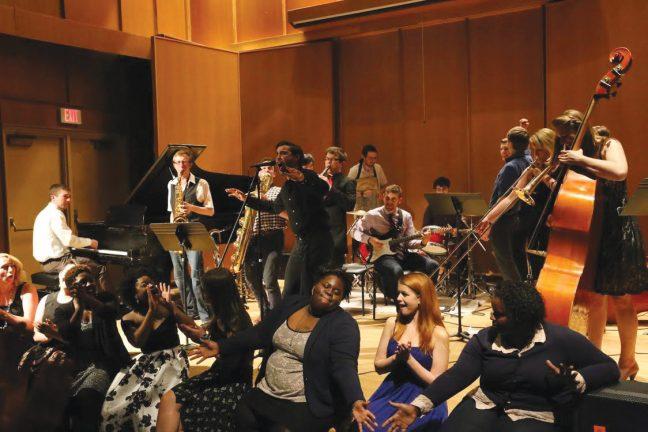For some people, music is something peripheral, a means to pass time or keep parties going.
For others, like Deja Mason, it’s a necessity. It’s something to express emotion, trace history and address experiences. University of Wisconsin’s Black Music Ensemble is dedicated to sharing passion and significance of music created by black musicians.

Through interpreting the music and performing it for fellow students and members of the Madison community, the vocalists and instrumentalists of BME are able to use their collective musical talent to support one another in a welcoming, relaxed space and start important conversations on campus.
What started as a course focused on black music, BME has over time become an audition-based student organization that hosts discussions, song workshops and holds several performances each semester. Working with the Wisconsin Union Theater and the School of Music, about 25 students gather each week to celebrate music, its racial history and its ability to bring people together.
“It’s not just a group of black musicians, and it’s not just a group of white musicians,” Mason said. “It’s a group that brings the personalities, the experiences, both musical and personal, into the group and then transforms that into the music we learn and perform.”
Mason is a student in UW’s business school, and though balancing coursework and music is difficult, she said being a part of BME has been one of her most defining experiences on campus. She said BME promotes individual growth and the further understanding of life.
Until this year, the group had been led by its now-retired faculty founder and motivator Richard Davis. Davis, who taught in the School of Music, loved to share his passion for jazz music and has left a lasting impression on his students. BME has centered itself on the jazz influence of Davis, but it also explores gospel, R&B, hip-hop, soul, rock and is even looking into country.
After taking Davis’ Black Music History course and learning from him through BME, Mason said she hopes to continue his legacy and extend influence to the new members of BME who haven’t had the opportunity to work with Davis personally.
“I’ve grown so much as an individual and as a musician having been under the tutelage of Richard Davis,” Mason said. “I’m not the same person that I was before I got into the group … I think [BME] gives everyone in the group the opportunity to explore.”
Since Davis’ retirement, BME has had to make a transition. The group’s cohesiveness and collective love for music of both emotional and cultural significance have prevailed, allowing BME to continue to thrive on campus. Members learn from one another and push each other to play to the best of their abilities. The supportive atmosphere in rehearsals and performances is what makes the group great to be a part of, Mason said.
Part of BME’s mission as a student organization is to bring attention to the great influence that black culture has had on music of all forms. BME asserts that race, among other forms of diversity, is important and ignoring different identities results in excluding individuals from certain spaces. The musicians of BME work to express that importance through emotional music.
“Seeing as black music has been the start of a lot of things that people are doing and [considering] the intricacies of how music has changed, it’s important to talk about it,” Mason said. “You can’t get away from it.”
BME creates a space for black musicians to be heard. Songs are not performed without a full understanding of their meaning and the experiences that went into their creation. Everyone involved appreciates others’ experiences and takes them into account during musical preparation and performance.
Taking these goals of racial awareness and extending the legacy of professor Davis BME has also developed a high school edition at Madison East High School. Some members of East’s BME have joined UW’s organization after admission, offering these students a rare opportunity to pursue their passion in a similar setting at two educational levels. For other members of the group, it’s exciting to watch their peers musically grow and develop.
BME aims to extend its welcoming atmosphere and love of music to others, fostering a space for students who want to learn about the intersection of music and culture, how it has changed over time and how to interpret and perform pieces for themselves.
“It gives me a way to not only relax but to enjoy music,” Mason said.














